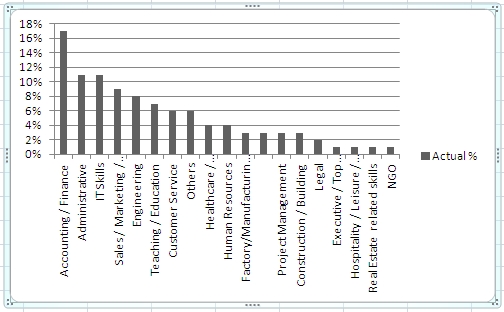Most graduates at some point begin to dislike their academic career choice. They wish they had studied something different though a lot of us will not want to admit it. It’s not such a bad thing to discover that the part you once thought was the right one for you suddenly turns out to be the wrong choice. If you consider it objectively, it is a great experience to once be on the wrong career track.
Before deciding to study a course in higher institution, it is always advisable to consider market trend and demand to determine what profession is worth going into. Or better still what to expect from your choice career when you graduate from school.
Last month, here on AfterschoolAfrica, I shared an article on Only 12% Employees in Nigeria are “happily employed” with reference from the Jobberman Salary Survey, the Nigeria leading job site. The article covered a faction of the information in the survey report. Today, after reviewing the report for the ‘nth’ time, I want to share with you a portion of the document that will be most helpful to current and prospective students who wish to become employed after graduation.
About the Survey
The Jobberman salary survey was conducted 100% online on 10,980 professionals from all over Nigeria. The survey was carried out as an inquisition into the world of employees in the Nigerian context in order to give Nigerians an idea of the income level of colleagues in many industries and job functions. About 68% of the survey participants have some form of tertiary education (either HND or Bachelor’s) and on a cumulative basis, 83% have a minimum educational qualification of either a HND or Bachelor’s degree.
Skills sector in descending other of employment rate
If you are a post-secondary or undergraduate student, it will help a lot to have an idea of what skill sets makes up the major part of the labor market. According to the research below is a list of the professions according to their level of presence in the job market.
| Skill sets employed on the job | Actual % |
| Accounting / Finance |
17% |
| Administrative |
11% |
| IT Skills |
11% |
| Sales / Marketing / Bus. Dev. |
9% |
| Engineering |
8% |
| Teaching / Education |
7% |
| Customer Service |
6% |
| Others |
6% |
| Healthcare / Pharmaceuticals |
4% |
| Human Resources |
4% |
| Factory/Manufacturing Industry |
3% |
| Media / Public Relations / Advertising |
3% |
| Project Management |
3% |
| Construction / Building |
3% |
| Legal |
2% |
| Executive / Top Management |
1% |
| Hospitality / Leisure / Travels |
1% |
| Real Estate related skills |
1% |
| NGO |
1% |
|
100% |
|
View Chart
From the stats above, it is evident that the top 5 most commonly employed skill sets in Nigeria are:
- Accounting/Finance
- Administrative skills
- Information Technology
- Sales / Marketing / Bususiness Development
- Engineering
The least common skill sets include:
- Construction/Building
- Legal
- Hospitality / Leisure / Travels,
- Real estate
- NGO related skills.
Important Note
While a lot of work went into the research work, the stats are not absolute representation of the job market. There could be factors affecting some of the figures. Like in the construction/building profession, most graduates in this field tend to become self-employed Building Contractors after few years apprenticeship, and so will not provide a true value of employment rate in the profession. You should make diligent research on your own before making conclusions on your choice career based on the information from this report.
Though it is clear that the level of unemployment is high in Nigeria, some professions generally have the higher share of graduate unemployment. The purpose of this article is not to encourage prospective students to jettison their passion/interest to pursue professions in popular demand. It is to give you a reference point upon which to make more informed career decisions.
Other interesting findings from the research:
- 29% of the employed Nigerians, who participated in the survey, earn between N21,000 and N50,000 (which is the largest proportion of respondents), 26% earn between N51,000 and N100,000 while only 1% earn over N1,000,000 per month. About 69% of professionals earn less than N100,000 per month.
- The oil and Gas Industry is the highest paying sector followed by the banking and financial service sector while the education sector is the least paying with 21% professionals earning N20,000 or less per month.
- The proportion of females with either a Bachelor’s degree or HND is more than that of males. Seven out of ten professionals that carried out the Survey were males, and yet more females have a Bachelors or an HND qualification.









